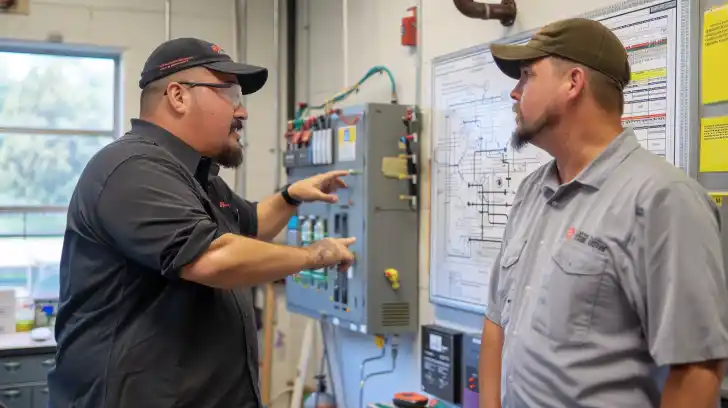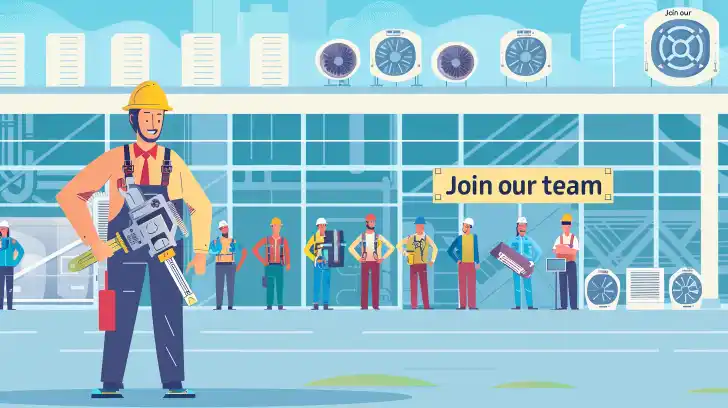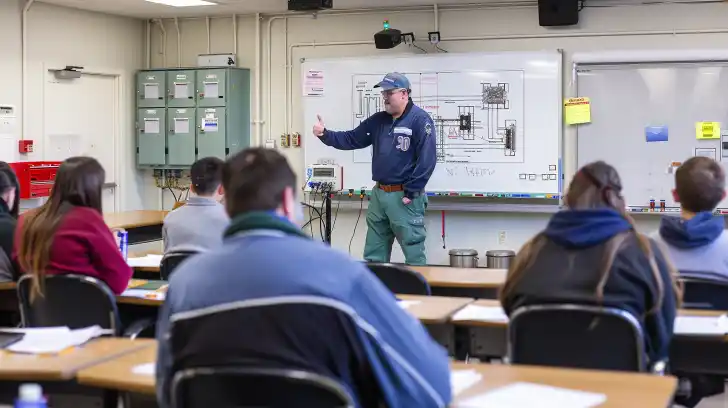No Experience Needed: Start Your High-Paying HVAC Career Earning Over $130K
Published on
7 minute read

Starting a high-paying HVAC career is now more accessible than ever. For those eager to enter the field, no prior experience is needed. The HVAC sector offers great pay and steady jobs to newcomers. It is growing fast, welcoming people with open arms. This growth is fueled by both seasoned experts and new talent.
Salaries in HVAC highlight the vital role these jobs play in keeping our spaces comfortable. There’s a rich array of opportunities for beginners willing to learn and work hard. In this industry, skill and effort lead to substantial rewards.
Key Takeaways
- The HVAC industry welcomes newcomers, offering high-paying careers with substantial incomes.
- Entry-level HVAC positions do not require a college degree, facilitating a barrier-free start.
- With a constant demand for HVAC services, job security is a prominent feature of the industry.
- Skilled HVAC technicians can expect significant opportunities for career advancement.
- The HVAC industry is resistant to economic downturns, underscoring its stability and growth potential.
The Attractiveness of High-Paying HVAC Careers
Starting a career in Heating, Ventilation, and Air Conditioning (HVAC) can be rewarding and lucrative. The HVAC job market offers high-paying positions that don’t require many years of education. By undertaking HVAC job training, individuals can gain the skills needed for success in this growing field.
Competitive HVAC Salaries Without a College Degree
HVAC salaries can compete with those requiring a college degree. This fact is enticing for many. With the right certification and experience, one can earn well. This opportunity motivates many to pursue technical careers, aiming for financial stability and success in HVAC.
The Constant Demand for Skilled HVAC Technicians
The constant HVAC job demand makes this career path attractive. Homes and businesses will always need climate control, ensuring HVAC techs are essential. This creates job security and lots of opportunities for skilled workers. Choosing an HVAC career can be a smart move for lasting success and growth.

| Position Title | Entry-Level Salary | Median Salary | Experienced Salary |
|---|---|---|---|
| HVAC Service Technician | $29,000 | $48,730 | Up to $75,000 |
| Commercial HVAC Specialist | $36,000 | $58,000 | Up to $90,000 |
| Industrial HVAC Technician | $40,000 | $62,000 | Over $100,000 |
The above table shows the earning potential in the HVAC field. It presents the wages from starting to highly experienced levels. This proves the high value of skilled HVAC technicians. Plus, the career offers stability and dynamic job conditions, appealing to those seeking reliable jobs without a college degree.
Understanding the Role of an HVAC Technician
The job of an HVAC installer and HVAC mechanic is complex. They work on both residential HVAC and commercial HVAC systems to make them work well. This helps property owners and people living there a lot.
An HVAC technician’s work includes a few key areas. For installation, they set up climate control systems in new and old buildings. For service and maintenance, they prevent problems to keep systems running smoothly.
Having a skilled HVAC technician service a system can lead to extended equipment lifespans, better energy efficiency, and improved indoor air quality, significantly heightening the comfort of a space.
Working on Residential HVAC means creating custom solutions for homes. This job needs them to be flexible and focused on the customer. On the other hand, commercial HVAC work involves understanding and setting up large systems. This includes complex ductwork and managing different zones.
One important benefit of HVAC systems is providing comfort all year round. This shows the high skill and problem-solving skills of HVAC technicians. They can also specialize in areas like green energy solutions or smart building systems as they gain experience.
| Residential HVAC Services | Commercial HVAC Services |
|---|---|
| Custom system installation | Large-scale system design |
| Routine maintenance and repair | Industrial equipment servicing |
| Energy-efficient upgrades | Complex ductwork and zoning |
| Emergency troubleshooting | Integrated climate control solutions |
In conclusion, HVAC technicians play a crucial role. They keep our living and working spaces safe, comfortable, and efficient. Becoming an HVAC installer or HVAC mechanic offers a rewarding career. It brings real benefits to people and our society.
Educational Pathways to a Successful HVAC Career
The journey to become an expert HVAC technician includes different HVAC job training methods. These methods aim to give aspiring professionals the skills they need. Whether through formal education or practical experience, each path helps candidates become more skilled and job-ready.

Getting an associate’s degree in HVAC is a great first step for many. It provides a strong base in heating, ventilation, and air conditioning theories. Programs cover refrigeration, HVAC controls, and designing systems, giving graduates a competitive edge in HVAC job placement.
Yet, college isn’t the only way into an HVAC career. HVAC apprenticeships are a core part of industry training, too. They let new workers learn from seasoned pros. These apprenticeships can last years, letting people gain lots of hands-on experience while they work towards certification.
- The requirement for HVAC job requirements typically includes a high school diploma or equivalent, coupled with technical and on-site training.
- Enrollment in an apprenticeship program often leads to industry-recognized credentials and enhances long-term job prospects.
- Hands-on training and certifications garnered through HVAC job training are essential in mastering the practical aspects of the job.
Whether you go for an associate’s degree or an apprenticeship, the goal remains the same. It’s about meeting HVAC job requirements and growing your career. Both educational paths aim to lead to professional positions, offering many opportunities in the HVAC field.
To sum up, there are various educational paths to enter the HVAC sector, including associate’s degree HVAC programs and apprenticeships. This means there’s a suitable track for anyone wanting to join this in-demand industry.
HVAC Jobs: Entering the Job Market
The need for cozy places to live and work keeps growing. So does the demand for HVAC job opportunities. People with HVAC technician training can find many jobs. Starting a career here is rewarding. It’s good for those switching careers because of HVAC apprenticeship programs. These programs, along with HVAC certification, help a lot.
HVAC Apprenticeships and On-the-Job Training
Entering the HVAC field often begins with an apprenticeship. These combine class learning and real work. Experienced pros teach the ropes. By the end, apprentices know a lot about fixing and maintaining HVAC systems. They’re ready for a solid career in a booming industry.
Required Certifications for HVAC Industry Standards
Earning certifications is key in HVAC. They prove skills and knowledge of safety and industry changes. These certificates mean excellence. They often lead to better jobs and more money.
| Certification | Description | Benefits |
|---|---|---|
| EPA Section 608 | Mandatory for technicians handling refrigerants, ensuring environmentally responsible practices. | Qualifies for a wider range of job roles; legally required for many HVAC positions. |
| State-specific licensure | Varies by location but generally covers business and trade practices, code compliance, and technical knowledge. | Essential for legal operation in certain states; fosters trust with employers and clients. |
| Industry-specific endorsements | Focus on specialized areas such as commercial refrigeration, home performance, or solar-powered systems. | Opens doors to niche markets and potentially higher earnings; reflects specialized expertise. |
Growth and Advancement Opportunities in HVAC Work
The career path for an HVAC technician is filled with chances for growth and improvement. This field rewards hard work and expertise, leading to job satisfaction. Those who show their skills can move up to better positions.
In this industry, growth is encouraged and recognized. Benefits like management opportunities and training are available. These perks help build a skilled workforce ready for the industry’s challenges. Advancement brings not only high pay but also joy in mastering this complex field.
HVAC jobs offer many areas to specialize in, like working on homes or big buildings. This variety lets technicians work in areas they like most. With a focus on green and efficient systems, skilled technicians are more sought after. So, growth in this field is not just likely, it’s expected for those who keep learning and improving.
FAQ
Can I start a career in HVAC without any experience?
Yes, anyone can start a well-paying HVAC career with no previous experience. There are entry-level jobs and apprenticeships that teach you all you need to know while working.
What are the benefits of pursuing a HVAC career without a college degree?
A HVAC career without a college degree offers competitive pay and job stability. It also opens up growth opportunities without needing four years of college.
Is there a high demand for HVAC technicians?
Skilled HVAC technicians are always in demand. This is because heating, ventilation, and air conditioning are essential in homes, offices, and factories.
What roles are available for HVAC technicians in the industry?
As an HVAC technician, you can work as an installer, mechanic, or service technician. There are jobs in both the residential and commercial sectors.
What educational pathways are available for those interested in an HVAC career?
There are many ways to start a career in HVAC. You can learn on the job, through apprenticeships, or by getting an associate’s degree in HVAC technology.
How do I enter the HVAC job market?
To get into the HVAC field, start with an apprenticeship or an entry-level job. These positions provide on-the-job training. You’ll also need industry-standard certifications.
What certifications are required to meet HVAC industry standards?
To work in HVAC, you must have certain certifications. These include the EPA certification for handling refrigerants and any state-specific licenses.
What are the long-term career prospects for HVAC technicians?
HVAC technicians can look forward to good job growth and more opportunities. As they gain experience, they find more satisfaction in tackling complex challenges.





